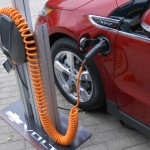Why It’s Cheaper to Charge an Electric Car than Fill Up With Gas

Photo by Friso Gentsch/DPA/LANDOV
Electric cars can be three times cheaper to fill up than traditional gas-powered vehicles.
The next time you’re pumping gas on a hot, sticky summer day, watching the numbers tick upward as you fill the tank with fuel that can sometimes run $4 per gallon, you may be surprised to learn that the person cruising past in an electric car is not only avoiding stopping at the pump entirely—they’re also paying about one third of what you are to “fill up” their tank.
Charging an electric car costs the equivalent of paying about $1.14 per gallon at the pump, according to a new tool from the U.S. Department of Energy (DOE) called eGallon. In other words, the average electric car can travel the same distance on $1.14 of electricity as a similar, gasoline-powered car can travel on $3.65 of gas, which is the average national cost for a gallon of gasoline. In Texas, the costs of fueling both types of vehicles are slightly lower. Texans pay an average of $3.37 per gallon to fill up at the gas station, and $1.09 per gallon to charge an electric car.
Driving an electric vehicle, then, costs about three times less than driving a gasoline-powered one. And it may become a little easier to drive an electric car in Texas this year.
Earlier this year, the Texas Legislature passed an omnibus energy bill, Senate Bill 1727, which updated and expanded the Texas Emissions Reduction Plan (TERP) program. The bill, among other things, has a two-year pilot program to give incentives of $2,500 to Texas customers who buy vehicles powered by electricity, compressed natural gas, or liquefied petroleum gas.
Electric car savings can vary significantly between states. In Washington State, the cost of charging an electric car is as low as 84 cents per gallon. In Hawaii, where electricity and gasoline are more expensive, fueling an electric vehicle costs $3.69 per gallon, only a few cents less than a gallon of gas.
The Department of Energy determines each state’s eGallon price by calculating how much electricity the most popular electric vehicles require to travel the same distance as similar 2012 model vehicles that are powered by gasoline. That amount of electricity is then multiplied by the average cost of electricity for the state. eGallon will be updated every month to reflect changes in state gas prices.
Electricity prices are less likely to fluctuate than gas prices, the department says, because the price of electricity is determined by local markets or state utility commissions, while gasoline prices are linked to the global oil market, which can be influenced by unpredictable events abroad.
“I think a lot of American drivers are very familiar with the fact that a plug-in electric vehicle can have a lower environmental footprint, and that it can be powered by domestically-produced electricity, eliminating the need for foreign oil imports,” said David Danielson, the Assistant Secretary for Energy Efficiency and Renewable Energy at the DOE. “But the average American is not aware of the fuel cost benefits associated with using an electric vehicle.”
Electric cars still tend to cost more up front than their gasoline-powered counterparts, although the 2013 Nissan Leaf S costs about $21,300 after federal tax breaks, which is comparable to the manufacturer’s suggested retail price for a 2013 Toyota Camry or a 2013 Chevy Silverado 1500. Electric vehicles appear to be gaining some popularity in U.S. markets. Last year, about 50,000 plug-in electric cars were sold in the United States, triple the number of electric cars that were sold in the previous year. According to Danielson, more than 30,000 electric cars have already been sold in 2013.
